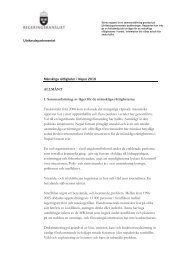Annual Report - National Human Rights Commission
Annual Report - National Human Rights Commission
Annual Report - National Human Rights Commission
Create successful ePaper yourself
Turn your PDF publications into a flip-book with our unique Google optimized e-Paper software.
Complaints Before the <strong>Commission</strong><br />
○ ○ ○ ○ ○ ○ ○ ○ ○ ○ ○ ○ ○ ○ ○ ○ ○ ○ ○ ○ ○ ○ ○ ○ ○ ○ ○ ○ ○ ○ ○ ○ ○ ○ ○ ○ ○ ○ ○ ○ ○ ○ ○ ○ ○ ○ ○ ○ ○ ○ ○ ○ ○ ○ ○ ○ ○ ○ ○ ○ ○ ○<br />
○<br />
State has an affirmative responsibility to the undertrial or convict. The State must provide<br />
adequate medical support. As such appropriate facilities should be provided in State<br />
assisted hospitals for undertrials who become mentally ill in prison. The person should be<br />
placed under the observation of a psychiatrist who will diagnose, treat and manage<br />
the person. In case such places are not available, the State must pay for the same<br />
medical care in a private hospital. In either case care must be provided until recovery of<br />
the undertrial/convict.<br />
vi)<br />
vii)<br />
viii)<br />
ix)<br />
When a convict has been admitted to a hospital for psychiatric care, upon completion of<br />
the period of his prison sentence, his status in all records of the prison and hospital should<br />
be recorded as that of a free person and he should continue to receive treatment as a free<br />
person.<br />
Mentally ill undertrials should be sent to the nearest prison having the services of a<br />
psychiatrist and attached to a hospital, they should be hospitalized as necessary. Each<br />
such undertrial should be attended to by a psychiatrist who will send a periodic report to<br />
the Judge/Magistrate through the Superintendent of the prison regarding the condition of<br />
the individual and his fitness to stand trial. When the undertrial recovers from mental<br />
illness, the psychiatrist shall certify him as ‘fit to stand trial’.<br />
All those in a jail, with mental illness and under observation of a psychiatrist should be<br />
kept in one barrack.<br />
If a mentally ill person, after standing trial following recovery from the mental illness is<br />
declared guilty of the crime, he should undergo term in the prison. Such prisoners, after<br />
recovery should not be kept in the prison hospital but should remain in the association<br />
barracks with the normal inmates. The prison psychiatrist will, however, continue to<br />
periodically examine him for reviewing his treatment and suggesting him other activities.<br />
x) The State has a responsibility for the mental and physical health of those it imprisons.<br />
While some of the recommendations below may appear to be of a general nature, they<br />
would help prevent people becoming mentally ill after entering jail. Each jail and detention<br />
center, therefore, shouldensure that it provides the following:<br />
i) An open environment, lawns, kitchen gardens and flower gardens, daily programmes<br />
for prisoners should include physical and mental activities that reduce stress and depression<br />
including organized sport and meditation.<br />
ii)<br />
A humane staff that is not unduly harsh;<br />
(a)<br />
Officers of the institution shall not, in their relations with the prisoners use force except<br />
64<br />
<strong>National</strong> <strong>Human</strong> <strong>Rights</strong> <strong>Commission</strong> <strong>Annual</strong> <strong>Report</strong> - 2004-2005<br />
AR-Chapter-1-19-10-6-06.p65<br />
84<br />
7/17/06, 6:29 PM
















